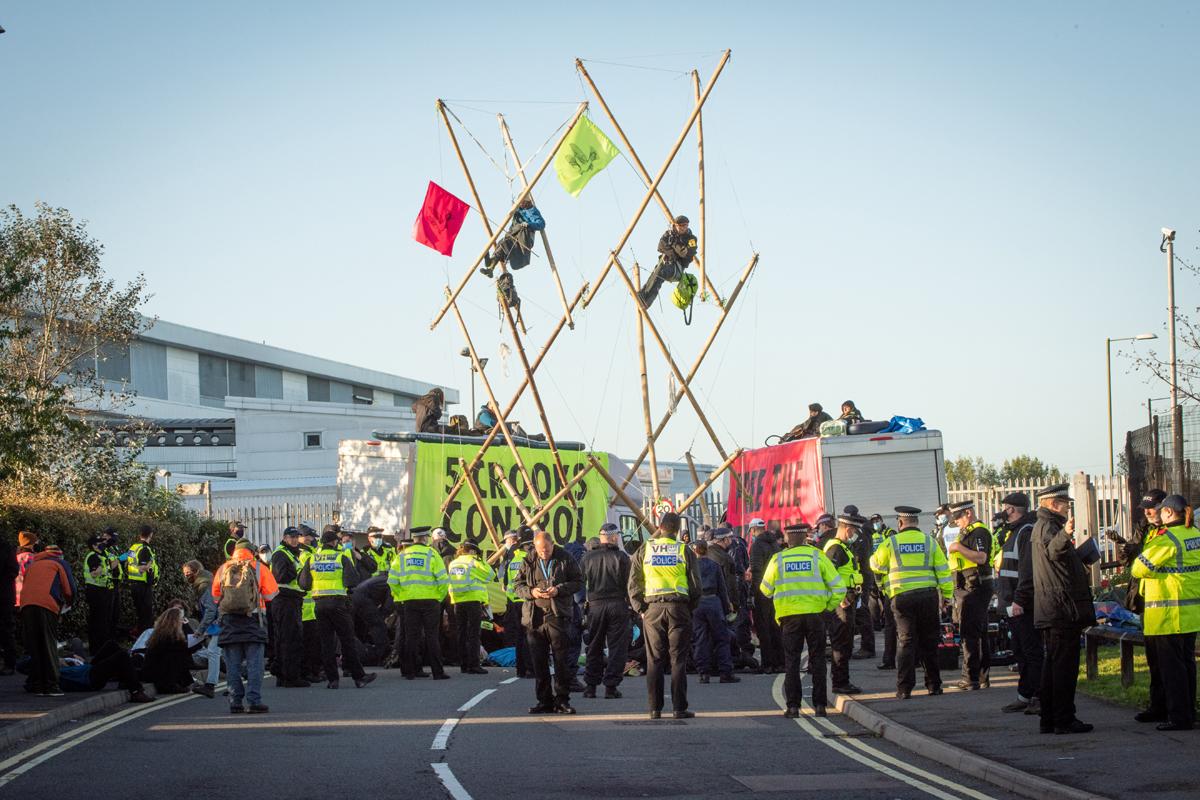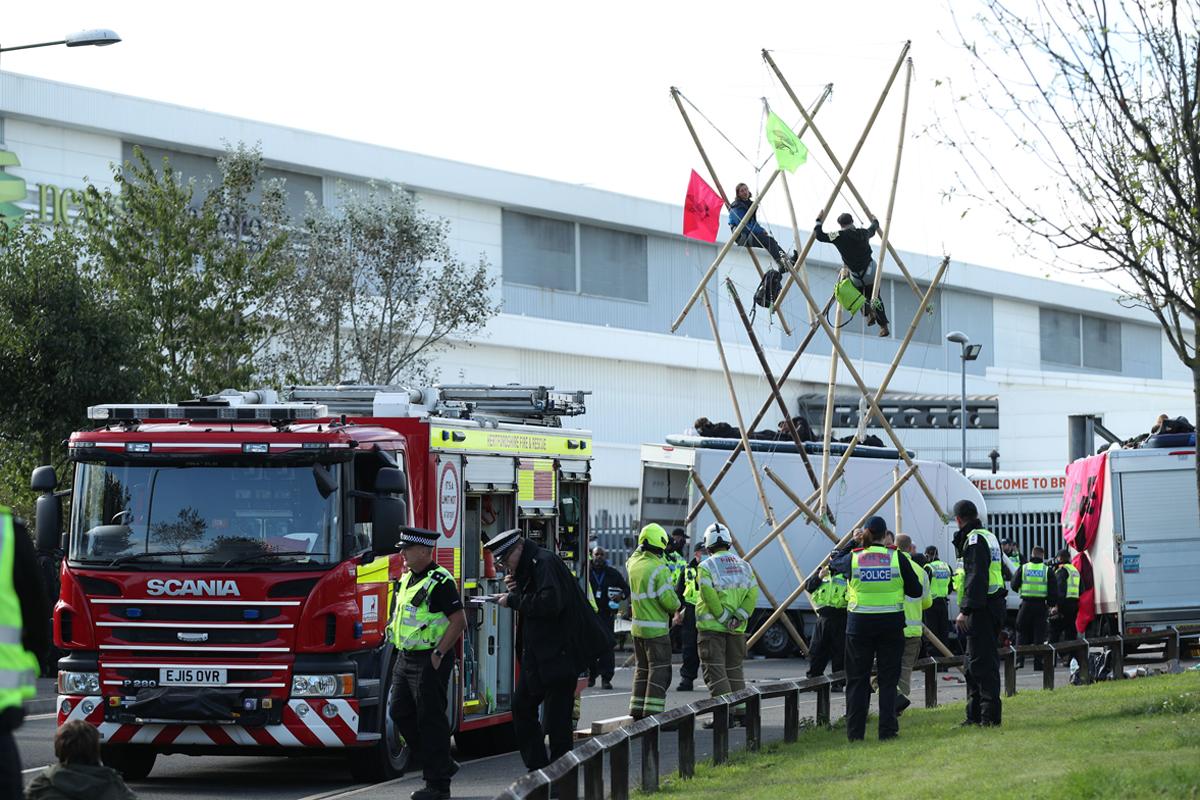Priti Patel showed ‘political interest’ in XR protest policing but did not exert ‘pressure’, court hears
Protesters’ trial heard the home secretary contacted chief constable multiple times during blockade of Murdoch printworks
Priti Patel showed “political interest” in the policing of an Extinction Rebellion protest but did not exert pressure on senior officers, a court has heard.
A trial at St Albans Magistrates’ Court has been told of multiple calls and messages from the home secretary to the chief constable of Hertfordshire Police during the blockade of a Rupert Murdoch-owned printing works.
Priti Patel publicly condemned the demonstration in September, calling it an “attack on our free press” and “completely unacceptable”, and dozens of activists have since been prosecuted.
The trial of six protesters heard that an independent review of the police operation highlighted the “volume of contact” between the home secretary and chief constable.
“Political contact from government ministers needs to be carefully considered in future to avoid decision-making falling outside our recognised command structures,” the report added.
Defence lawyers made applications to see records of contact between Ms Patel and police officers, which were partly allowed by a judge, and argued that “interference by the state” would have contravened the operational independence of the police.
The court heard that records of contact with the home secretary were deleted from the chief constable’s phone because of an “automated factory reset”, but District Judge Sally Fudge reviewed screenshots of messages from other sources.
Prosecutor Nigel Ogborne told the court the defendants should be found guilty of highway obstruction.
In his closing submissions on Monday, he said the police officers involved said their decisions were not influenced by Ms Patel and that she had asserted “political interest, not political pressure”.
“The protest was not proportionate in the circumstances - it was not carefully targeted, it lasted far longer than was necessary,” Mr Ogborne added.
“The police were not breaching the rights of these defendants by arresting them and their arrest and removal was proportionate.
“The actions of the police were not in any way influenced by the decisions of politicians.”

The court previously heard that the home secretary exchanged several calls and text messages with chief constable Charlie Hall as the Broxbourne protest continued through the night.
Owen Wetherill, the assistant chief constable of Hertfordshire Police, said in the phone call first notifying him of the demonstration on 4 September, he was told that the prime minister and home secretary were “taking an interest”.
Mr Wetherill said his superior told him he had been in contact with Ms Patel, and that she “had been seeking an early intervention” to remove protesters.
He told the court that he believed the chief constable travelled to force headquarters overnight because of “government interest” in the Extinction Rebellion protest, and did not have any operational responsibilities.
Mr Wetherill denied being put under “political pressure” himself and said his decisions on how to respond to protesters were not affected.
“At no point was I put under pressure,” he told the court. “I would have been surprised if there wasn’t that kind of political interest because of the nature of the protest and where it was. I wouldn’t say it influenced my decisions.”
The prosecution also dismissed potential arguments that the defendants should be acquitted because of a recent Supreme Court ruling that highway obstruction can be lawful in some protests.
Britain’s most senior judges said it was right to acquit a group of protesters who blockaded the Defence and Security Equipment International (DSEI) arms fair in London in 2017 even though they used “deliberately physically obstructive conduct”.
“There should be a certain degree of tolerance to disruption to ordinary life, including disruption of traffic, caused by the exercise of the right to freedom of expression or freedom of peaceful assembly,” a majority ruling added.

The trial in St Albans was adjourned to await the ruling, but Mr Ogborne said it was not relevant because the Extinction Rebellion protest in question was more disruptive and lasted far longer.
He told the court that the eight-hour blockade of the Newsprinters site in Broxbourne, using vehicles and bamboo structures, stopped employees from driving home and affected newspaper distribution to 30,000 retailers.
The case concerns the second group of defendants who have been charged with obstructing a highway at the protest.
Caspar Hughes, 49, of Exeter, Elise Yarde, 32, of Walthamstow, Amir Jones, 39, of London, Laura Frandsen, 30, of London, Charlotte Kirin, 51, of Bury St Edmunds and Hazel Steson, 56, of Bury St Edmonds, deny all charges.
Giving evidence on Monday, the defendants said they felt the action was necessary to draw attention to the “climate emergency” and accused Murdoch-owned titles of failing to properly report the issue.
Ms Kirin, a social worker, told the court: “People are dying now, there are fires and floods and droughts and famine being caused by climate change. The emergency requires us to take action now.”
Ms Steson broke down to tears in the witness box, as she spoke of fears that her daughter would be “fighting to live”.
“I think we’re actually too late, it’s happening all over the world,” she told the court. “We’re going to be suffering a lot worse than the inconvenience we’ve caused.”
Ms Yarde, a former teacher, said she and her fellow protesters were “tring to prevent or ease the tragedy that we are heading towards”.
Mr Jones, a former civil servant in the Department for Digital, Culture, Media and Sport, said Extinction Rebellion wanted to “impact the news cycle” and argued that the impact on the wider public was “small and proportionate”.
Ms Frandsen, who appeared via video-link, told the court: “More people are going to die, more people are going to be displaced. We’re basically riding off a cliff now because people have failed to take action.”
The defence will make their closing submissions on Tuesday, and District Judge Fudge will retire before giving her judgment on 16 July.



